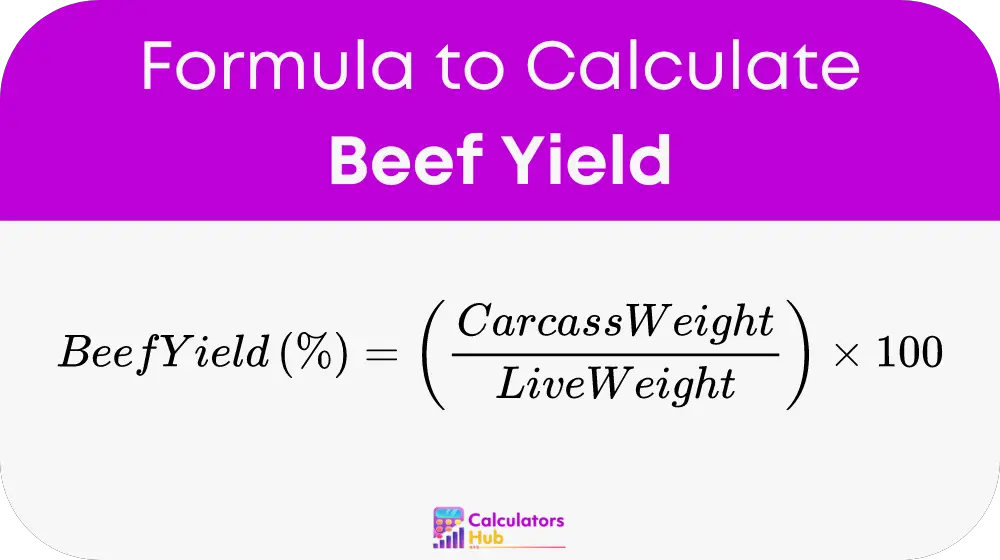The Beef Yield Calculator is a valuable tool used by beef producers, farmers, and meat processors to determine the yield percentage of beef from a live animal. This calculation is crucial for understanding how much usable meat can be obtained from a carcass after slaughter and processing. The yield percentage provides insights into the efficiency of meat production and helps in estimating the potential revenue from beef sales.
Accurately calculating beef yield is essential for making informed decisions about cattle selection, feeding strategies, and pricing. By using the Beef Yield Calculator, producers can optimize their operations to maximize meat production and profitability.
Formula of Beef Yield Calculator
The formula to calculate Beef Yield is:

Where:
- Carcass Weight is the weight of the beef carcass after slaughter, typically measured in pounds or kilograms.
- Live Weight is the weight of the animal before slaughter, also measured in pounds or kilograms.
Steps to Calculate Beef Yield
- Determine the Live Weight:
Measure the weight of the animal before slaughter. This is typically done on a scale and is recorded in pounds or kilograms. - Measure the Carcass Weight:
After the animal is slaughtered, the carcass is weighed. This weight represents the amount of usable beef, excluding non-meat parts like the hide, head, and internal organs. - Calculate the Beef Yield Percentage:
Divide the carcass weight by the live weight and multiply by 100 to get the yield percentage. This figure represents the proportion of the animal’s live weight that is converted into meat.
General Terms and Reference Table
Below is a reference table that outlines common beef yield percentages and what they mean for different types of cattle. This table provides a quick reference for producers to better understand the expected yield from their livestock.
| Live Weight (lbs) | Carcass Weight (lbs) | Beef Yield (%) | Interpretation |
|---|---|---|---|
| 1,200 lbs | 750 lbs | 62.5% | Typical yield for well-finished cattle. |
| 1,000 lbs | 600 lbs | 60% | Average yield, suitable for standard beef production. |
| 1,400 lbs | 875 lbs | 62.5% | High yield, indicating efficient meat production. |
| 1,200 lbs | 690 lbs | 57.5% | Lower yield, may indicate lighter carcass or more fat. |
Example
Let’s go through an example to see how the Beef Yield Calculator works in practice.
Suppose you have a steer with a live weight of 1,300 pounds. After slaughter, the carcass weight is measure at 800 pounds.
Using the formula:
Beef Yield (%) = (Carcass Weight / Live Weight) * 100
Substituting the values:
Beef Yield (%) = (800 / 1,300) * 100 = 61.54%
In this example, the beef yield is approximately 61.54%. This means that 61.54% of the steer’s live weight was convert into usable meat. This yield is typical for well-finished cattle, indicating efficient meat production.
Most Common FAQs
Several factors influence beef yield percentage, including the breed and genetics of the cattle, feeding practices, age at slaughter, and the amount of fat and muscle on the animal. Proper nutrition and management can help improve yield percentages.
While a higher yield percentage indicates more meat from the animal, it’s essential to balance yield with meat quality. Overly lean carcasses may have a high yield but could lack marbling, affecting the taste and tenderness of the meat.
Improving beef yield involves selecting cattle with good genetics, providing proper nutrition, and managing them to achieve an optimal balance of muscle and fat. Monitoring and adjusting feeding strategies, as well as selecting the right age for slaughter, can also help maximize yield.